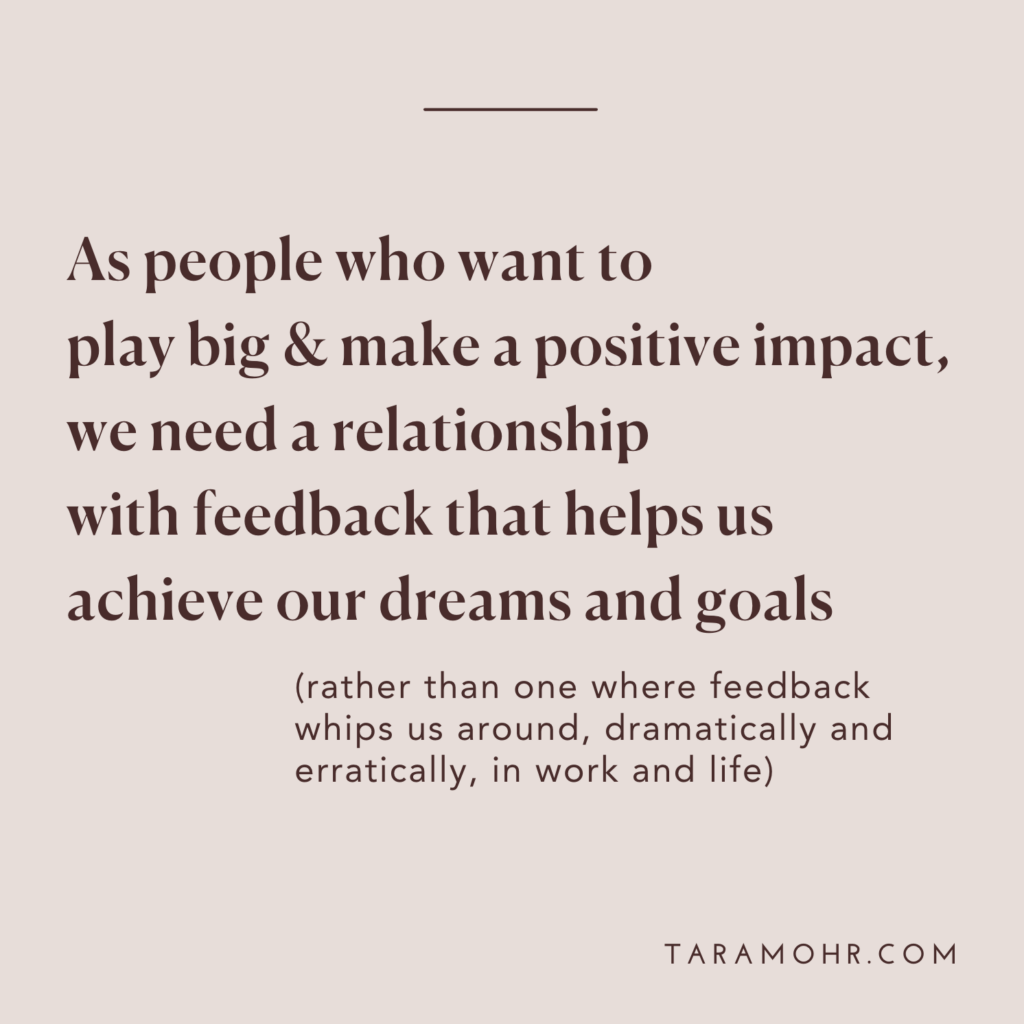We all get a lot of feedback.
There are the more obvious forms of feedback – a client’s feedback about a session, a performance review with your boss at work, some honest and tough feedback from a teenager in your life, and so on.
Then there are the more subtle forms of feedback.
Posting something on social media about a political cause that matters to you and getting tons of positive responses? Feedback.
Applying for fifty jobs and not hearing back from any? Feedback.
No sign ups to your course? Feedback.
Getting rehired by the same consulting client over a decade? Feedback.
Being asked by your community organization to run for a leadership role? Feedback too.
Every day, we find ourselves in feedback situations. That means we need an everyday toolkit for working with feedback. And particularly those of us who have been taught to be people-pleasers or to put others’ opinions before our own internal sense of authority – we need a relationship with feedback that helps us achieve our most important dreams and goals, rather than one where feedback ends up whipping us around – dramatically and erratically – in work and life.

And looking through the bigger picture lens, thinking about women playing bigger, sharing our voices, bringing our work into this broken world to make it a better place…
…if we take feedback as a referendum on us, and go on an ego-up-and-down roller coaster with it, we simply aren’t going to be able to do the needed, revolutionary, beautiful work we are here to do.
But if we take feedback as valuable information – information about the people we are trying to reach, change, support, engage – then we have a shot at refining our work to be truly impactful.
So today I’d like to share with you the Playing Big model for Unhooking from Praise and Criticism – the model for working with feedback – including the new additions to that model since the Playing Big book came out.
It’s been fantastic to see how widely applicable this model is. I’ve seen it have positive impact on… a 7th grade girl thinking through her teacher’s harsh feedback, a professor unpacking being denied tenure, a worn-out job seeker needing to bounce back from rejections, a social justice focused artist wanting to grow audiences for her work. The Playing Big model is even being used in Fortune 500 companies pre-performance reviews, to help people have truly constructive conversations (because we know how those can often go!).
But before I go further, let me also say what the Unhooking from Praise and Criticism model is not a good fit for. It is not a good fit for situations when the feedback you receive involves someone speaking to you about your privilege, biases, or blindspots. That is a crucial kind of feedback, and a genuine learning and reflection process should follow. Opening up to and really hearing that kind of feedback, and changing as a result of it, requires its own specific kind of process (and what I’ll share below is not the right toolkit for it).
So, keeping that in mind, you can use the Playing Big Unhooking from Praise and Criticism process when:
- you are receiving the polarized reaction or especially personal or harsh feedback that visible, vocal women often get
- you are receiving any kind of everyday feedback on a product or service, job role or piece of work such as customer feedback, workplace performance reviews, audience feedback for creatives, hiring decisions for job seekers, and so on.
So, let’s walk through the model.
Let’s say you’ve gotten ten rejections from publishers. Or, your boss said you need to have more “executive presence.” Or, a client said sessions with you feel rushed. Here are the four steps to take.
Step 1: Reframe the Feedback
Ask yourself: what does this feedback tell me about the person or people giving the feedback? What does it tell me about their needs, preferences, or priorities?
This reframing is the big mental and emotional pivot point.
Typically, we think feedback is telling us something about ourselves. Then we tend to get defensive (if we think the feedback is wrong, off-base, crazy!), or we get deflated (if we think the negative feedback is maybe true). And if we think positive feedback is deeply about us (rather than about the other party), we often get so pumped up or relieved that we fail to reflect on what the positive feedback is teaching us about what others are looking for or resonate with – what we might give or do more of. In other words, whether it’s negative or positive, we go on an egoic roller coaster with the feedback, instead of understanding strategically useful information.
But instead, we can see feedback as information about the point of view, needs, priorities, perhaps fears or preferences of the person or people giving the feedback.
Your client says the work felt rushed? That doesn’t really tell us any facts about whether you were rushing, but wow does it reveal something interesting and important about your client’s experience.
Ten publishers rejected your book? That really doesn’t give us any facts about you as a writer, but it might start to point us to some information about what publishers are looking for. If we asked some follow up questions about the rejections, we likely would learn even more about that.
When we reframe feedback and we start to think about the valuable, revealing information we are getting, the emotional charge dissipates, and we often find we are curious to even learn more.
Step 2: Check for Relevance
Quite often, women especially assume that being a decent human means caring about everyone’s opinion. Patriarchal myth alert!! None of us are going to get important work done while pleasing everybody.
We need to ask, is this feedback relevant to me achieving my goals?
If the feedback is from a boss in a job you want to stay in, the answer is probably yes.
If the feedback is from one of the few women of color in your organization, and you believe in equity and inclusion, yes, it’s highly relevant.
If the feedback is from the gatekeeper to something you need (like funding, access, press, etc.), likely the feedback is relevant.
But… if the feedback is from your PhD advisor from 20 years ago and you are no longer even in academia… it’s probably not relevant.
If it’s comments on your home from the auntie whose cleanliness standards you don’t even want to live up to… then the feedback is probably not relevant.
If the feedback is relevant to you, keep going – time for step 3.
If it’s not relevant to you, congrats, you are done with the process on the feedback! Return to focusing on your core goals, and to feedback from the stakeholders that are relevant to those goals.
Step 3: Revise Your Approach
If you determined this feedback is relevant to you, consider how you might want to revise your approach, in light of the feedback you’ve received.
So, maybe you learned publishers are looking for books with a snappier main idea, and you feel okay about revising your book proposal to align with that.
Maybe you learned your client easily ends up feeling rushed, and that she’d really like to cover fewer topics in each session, and revising in that way feels good and doable to you.
But take note: in this model, you are not revising your approach because there is something wrong with you that you are trying to fix. You are simply revising your approach to be more effective with the particular stakeholders you want to reach. How liberating!
This step is where you may also end up discerning, “I’m really not okay adapting my work or myself in the way that’s desired or expected here.”
Then you can consciously choose not to adapt in light of the feedback – having made a conscious and intentional choice. Maybe you decide instead to explore other situations where you think the feedback would likely be different. Maybe you come up with some creative third way that takes the feedback into account but isn’t a revision to your work or approach that feels misaligned. All valid, thoughtful choices.
Step 4: Tend to the Relationship
Some feedback situations feel very neat and tidy – and they don’t raise relationship issues. But other times, there’s a relational and emotional dimension that needs our attention. In steps 1-3, we reframed the feedback, evaluated its relevance, and (if applicable) revised our approach to the work – all so that we can work more effectively with those who shared the feedback. That’s the strategic piece.
Alongside of it, we may also need to tend to the relationship dimension – the relationship with self, with individuals who shared the feedback, and sometimes with the organization or larger body involved.
Maybe a client’s feedback revealed that long-term, they probably aren’t the right fit for you. Maybe performance review feedback felt manageable to adapt to for now, but also left you with concerns about how authentic you can be with your manager. Maybe there’s a follow up conversation you’d like to have about that.
Step 4 is where we weave in our bigger toolkit of relationship tools and:
- Feel any lingering feelings around the feedback – often sadness, joy, relief, anger, hurt. We give ourselves time and space to feel, perhaps journal about them, or talk them through with someone who we know can be a good listener.
- This is also the step where we reflect: are there any new conversations we want to have, requests we want to make of the other party, or boundaries we want/need to set in the relationship?
This is how we steward our own wellbeing in a world where feedback comes at us, a lot.
So, to recap on our four “R’s” and their key questions, for feedback situations large and small:
Step 1 – Reframe: If you interpret this feedback as information about the person/people giving the feedback, what might this tell you about their preferences, priorities, or perspective?
Step 2 – Check Relevance: Is their feedback relevant to me? Is it useful in helping me achieve my goals?
Step 3 – Revise Your Approach: If so, how can I revise my approach to incorporate this feedback?
Step 4 – Tend to Relationship: Are there any relationship pieces around this feedback that I need to tend to, such as boundaries, processing my own feelings, or making requests?
Try it out, and let me know how it goes! Grab the printable journaling 1-pager here to take yourself or those you support through the 4 R’s.
And share this with a friend or colleague who would benefit!
We do much more unpacking of Unhooking from Praise and Criticism, and giving and receiving feedback, with case studies, coaching demos + lots of Q&A in the Playing Big courses. Learn more about our programs here!







